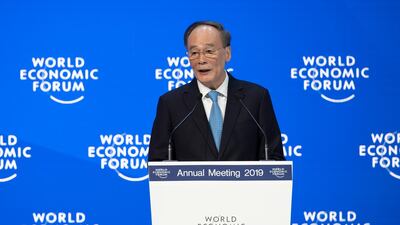China’s vice president rebuked efforts by the West to rein in its leading technology companies such as Huawei in Davos on Wednesday, as Japan’s and Germany’s leaders rejected nationalism and re-emphasised their countries’ commitment to international co-operation to solve the world’s problems.
At the World Economic Forum’s Annual Meeting, Wang Qishan said there had to be a balanced attitude to technology that accommodates the interests of all countries, especially those of emerging markets and developing countries.
“One should not ask the whole world to address only the security concern and comply only with the standards of developed countries or individual countries,” he said.
_______________
Davos 2019
World Economic Forum: Shinzo Abe tells Davos defeatism about Japan is defeated
Mike Pompeo says Middle East coalitions vital to countering Iran
Postcard: Geopolitical prospects take the limelight in Switzerland
UAE signs deal to host research centre of the future in Dubai
Sir David Attenborough warns of limitless environmental harm
Davos chief Klaus Schwab sends environmental warning in opening address
____________
The US Justice Department is pursuing the extradition of the chief financial officer of China’s Huawei, who was arrested in Canada last month. The United States has accused Meng Wanzhou of misrepresenting the company’s links to a company that tried to sell equipment to Iran despite US sanctions.
Huawei, the world’s biggest producer of telecoms equipment, faces US-led allegations that its devices present a national security risk. Huawei says such concerns are unfounded.
President Donald Trump’s administration has been pushing European allies to block Huawei from telecoms networks amid a wider dispute over trade with China.
“It is imperative to respect national sovereignty and refrain from seeking technological hegemony, interfering in other countries’ domestic affairs, and conducting, shielding or protecting technology-enabled activities that undermine other countries’ national security,” Mr Wang said.
But Mr Wang indicated he was optimistic that the US and China would resolve their differences on trade and ultimately find a “win-win” for both sides.
The theme of this year’s meeting is Globalisation 4.0: Shaping a Global Architecture in the Age of the Fourth Industrial Revolution, asking how to make it inclusive and sustainable for all.
Mr Wang criticised the approach taken by some after a wave of populism consumed the political landscape in the UK, parts of Europe and in the United States.
“Shifting blame for one’s own problems on to others will not resolve the problems,” he said.
Instead, countries must press ahead with structural reform, adopt effective policies to prevent the worsening of income inequality and mitigate any pain caused to industries by new technologies, “so that all people stand to gain from continued development”.
“What we need to do is make the pie bigger while looking for ways to share it in a more equitable way. The last thing we should do is to stop making the pie and just engage in a futile debate on how to divide it,” he said.
German Chancellor Angela Merkel, who is expected to step down in 2021, said global multinational institutions are in need of reform if they are to reboot globalisation and make it more fair.
“The question of how to move forward is one that splits the world,” she said.
But Mrs Merkel criticised the “new approach in the world that says shouldn’t we look after our own, and ensure that our own are looked after”.
“I have great doubts about this approach. We should always remember that others have their own vested interests,” she told the forum. “Compromise these days has a bad reputation. But I say that a global architecture is possible only if we are able to compromise.”
Prime Minister Shinzo Abe laid out his plans for Japan's chairmanship of the G20, a group of the world's largest economies, proclaiming an ambitious legacy for the coming Osaka summit in June.
“I’d like Osaka G20 to be long remembered as a summit that started worldwide data governance,” he said.
“We will be inviting to Japan [the] topmost experts in science and technology from G20 member countries to combine forces in accelerating innovation.”
“We must make data a great gap buster through AI, IT and robotics.”
The Japanese leader also called for more radical approaches to tackling climate change, particularly in the oceans.
“We must invite more ... disruptive innovations before it is too late,” he said. “In Osaka, I’d like to create a shared sense that it takes a worldwide commitment to reduce not to increase plastics into the seas,” he said.


